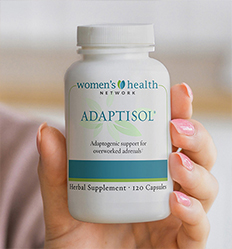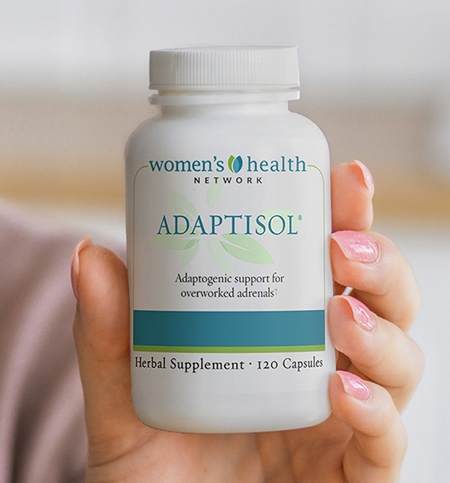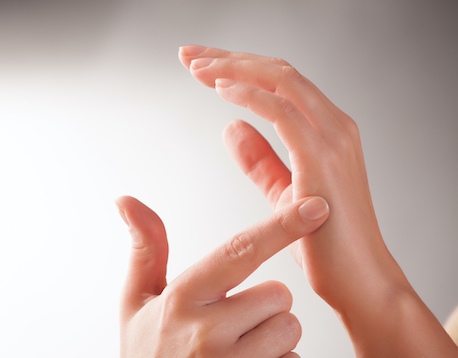Reviewed by Dr. Sharon Stills, NMD
Feeling tired all the time seems to be a given these days. In fact, studies show that nearly 40% of the U.S. workforce struggles with fatigue – affecting productivity at work, time with family, the ability to practice self-care and much more. From what women tell us, we think the real figure is actually much higher, making fatigue a modern day epidemic.

And it’s not just our crazy schedules that are draining us. Fast food, over-use of electronics, sleep deprivation, yo-yo dieting, and other physical and psychological stressors also burden our bodies, making us feel completely exhausted.
These aspects of modern living can, and do, lead to physiologic changes that set us up for a state known as adrenal imbalance. Your adrenal glands perform many important jobs — they manage your stress response, help balance blood sugar, support your sleep-wake cycle and a whole lot more. With adrenal imbalance, your fatigue is likely to get worse — unless you do something about it.
The root source of fatigue: adrenal imbalance
The adrenal glands and the stress hormone cortisol are intimately connected to circadian rhythm — the natural clock our bodies follow that sets the patterns for being asleep and being awake. Cortisol naturally rises in the morning, reaching a peak about 8:00 am — 9:00 am and then gradually declines throughout the day to prepare your body for sleep. Yet adrenal fatigue can turn this rhythm on its head, making it impossible for you to get out of bed in the morning and keeping you wide awake when it’s time to sleep at night.
The fatigue cycle is intensified by consumption of caffeine and sugar, which quickly bring energy levels up but then lets them plunge quickly. Caffeine causes your adrenals to pump out more cortisol and adrenaline, keeping you sharp and awake for a while. But this takes your body out of its natural rhythm and further depletes your adrenal reserves. Sugar raises your blood sugar and insulin, setting you up for an energy crash and subsequent sugar cravings.
Keep in mind there may be other causes contributing to your fatigue, including chronic inflammation, food allergies and chemical sensitivities, and infectious diseases such as Lyme disease, among other factors. And fatigue can also result from the combination of several of these factors. If you aren’t sure what’s behind your fatigue, it’s a good idea to talk over your symptoms with your doctor.
The effects of fatigue on your health
Unfortunately, women often ignore their increasing fatigue until it leads to other disruptive symptoms. By that time, the side effects of fatigue may become nearly constant. They include:
- feeling drained mentally and physically
- inability to bounce back after being sick
- headaches
- joint pain
- depression
- poor short-term memory, confusion, irritability
- food cravings, particularly for sweets/carbs
- weight gain
- a “second wind” after 6:00 pm that interferes with your ability to sleep
The long-term effects of adrenal-related fatigue can include disruptions in sex-hormone balance (making PMS and menopause symptoms even worse) and thyroid-hormone balance (often leading to hypothyroidism or low thyroid). Constant fatigue can also accelerate aging, disrupt blood sugar regulation, contribute to chronic disease and hinder your ability to combat illnesses.
You can get your energy back!
For many conventional doctors the symptom of “fatigue” is too vague to treat. In fact, many of us are told fatigue is just a normal part of aging, so we rely on sugar and caffeine to keep going. But these “crutches” can only work for so long because they worsen adrenal imbalance — and exhaustion. The key to solving ongoing fatigue is to rebalance your adrenal glands.
We can help you do this naturally with minimal impact on your body. Whether your fatigue is mild, moderate or severe, our Adrenal Health Programs can be customized to your symptoms.
Having more energy and effectively supporting your adrenal glands takes a whole-body approach and we’ve helped thousands of women feel better. We can help you too.
For more information on our approach to fatigue, see our article on the Natural cure for your exhaustion.
Ricci, J.A., et al. 2007. Fatigue in the U.S. workforce: prevalence and implications for lost productive work time. J Occup Environ Med. 49(1): 1-10. URL (abstract): https://www.ncbi.nlm.nih.gov/pubmed/17215708.
Health & Human Services, Centers for Disease Control and Prevention, “Chronic Fatigue Syndrome” : https://www.cdc.gov/ncidod/diseases/cfs/about/demographics.htm
(accessed 03/15/06).
A.D.A.M. Medical Encyclopedia [Internet]. Atlanta (GA): A.D.A.M., Inc.; c1997-2012. Chronic fatigue syndrome; [last reviewed 2012 Feb 2012; cited 2012 May 15]. Available from: https://www.ncbi.nlm.nih.gov/pubmedhealth/PMH0002224/












